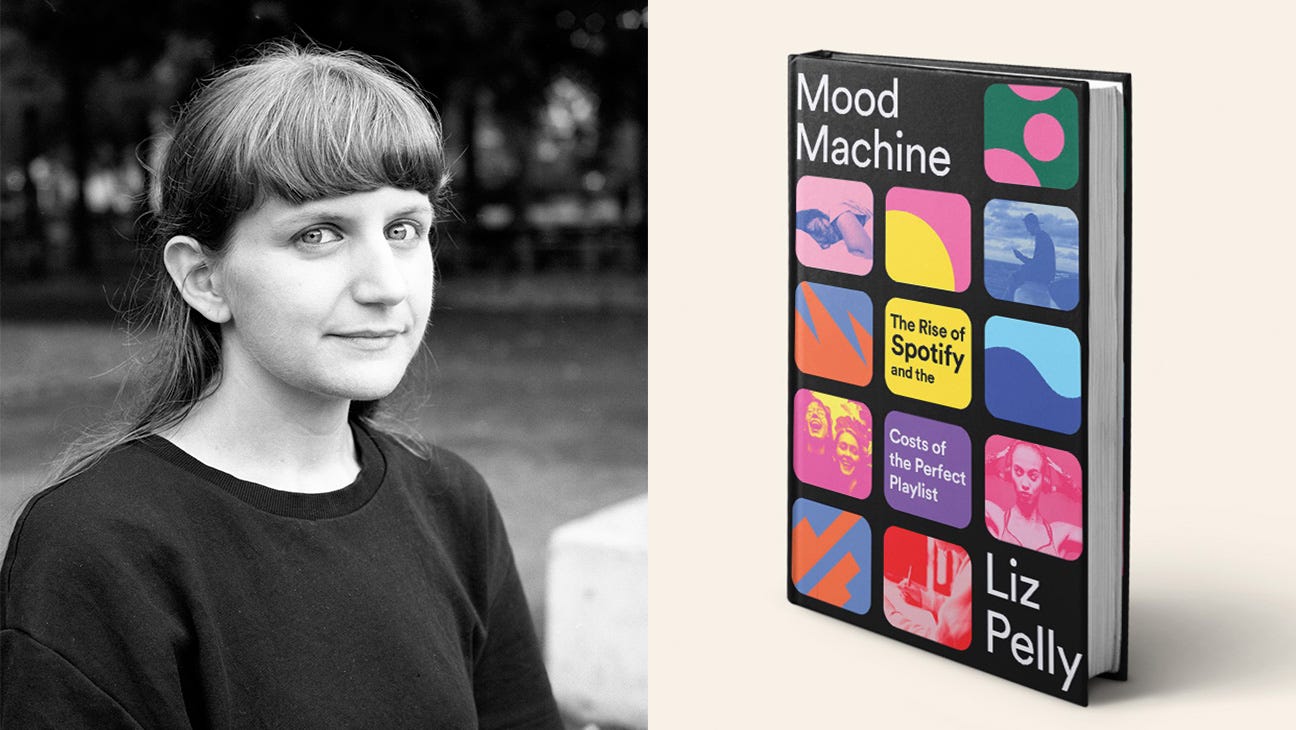Bi-Weekly-ish Newsletter #69 w/ YoungCapital's Body Horror 🧟♂️, Ska's Minty Past 🦷, Spotify's Ghost Game 👻, AI's Next Level 🤖, and Existential Screams 💀
Hey Reader,
A fresh 2025 edition of the bi-weekly-ish newsletter on music, tech, culture, and more music by yours truly Marcel Alexander Wiebenga.
This edition takes us from workplace body horror to dental hygiene ska, through Spotify's ghost productions to AI agents, and ends with some light bedtime reading about the end of civilization.
You know, the usual uplifting stuff.
Enjoy!
1. A Boomer's Guide to Gen Z Energy
When Workplace Comedy Meets Body Horror
Starting close to home with a delightfully bizarre commercial produced out of Amsterdam that features sound design by our very own landlord / Ringo investor, Niels den Otter of Audentity. Amsterdam agency ACE and director Angelo Cerisara have created what they're calling a "Y2K Cronenbergian fashion techno musical" for employment agency for students, starters and young professionals, YoungCapital.
The campaign introduces "BOOOMer" - a fictional energy drink that harnesses "youth essence" to help older generations keep up with their Gen Z colleagues. The film is gloriously weird, mixing body horror, workplace comedy, and high fashion aesthetics in a way that somehow works as it walks a thin line between absurdist humor and social commentary.
With 150,000 actual "BOOOMer" energy drink cans supposedly produced (minus the youth essence extraction, thankfully), this campaign goes all in on its concept and shows true guts and dedication from all parties involved, something I hope we get to see more of this year. Watch the spot below!
2. Ska-y Clean Teeth
When Madness Met Minty Fresh
Look, don't ska me why, but between doomscrolling through scantily clad influencers trying to lure me to their OF, watching Wiz Khalifa nail some surprisingly solid Muay Thai techniques, and being bombarded with suspiciously easy daily cooking recipes, I stumbled upon the gem below that made me smile and think of easier times (cause 1984 was just a breeze). And yes, while I've been (wrongly) predicting two-tone's big comeback for four years running - thankfully to no avail as country music takes over 2025 instead (Frankie Laine's "Rawhide" for the win, yeehaw!), this commercial does make an excellent case for Ska's triumphant return.
In 1984, Colgate Blue Minty Gel created advertising magic by reimagining Madness's "Baggy Trousers" for British TV. Even for those who'd rather eat Doc Martens than attend a ska revival show, this is pretty brilliant. The commercial features school kids singing about fresh breath and shiny teeth to the tune of the ska classic, capturing both the band's cheeky energy and the product's promise in a way that even a ska skeptic can appreciate.
Whether you're a Madness fan, a vintage ad enthusiast, or need a quick hit of nostalgia between learning roundhouse kicks and meal prep tips, this one's worth a watch. Check out how Colgate turned dental hygiene into a surprisingly tolerable ska party below!
This is an ad…
Look, while we dig up 1984 toothpaste commercials featuring ska classics (for better or worse), at Ringo, we're focused on making music licensing less painful than a ska revival concert. Our algorithmic pricing tool determines Expected Sync Value (xSV) faster than you can say "pick it up, pick it up, pick it up."
We're bridging the gap between artists and agencies, making sync licensing simple, safe and stress-free. No need to skank your way through endless email chains with publishers and labels.
And this time I really mean it when I say we're launching in public beta REALLY soon.
👉 Join the waitlist at www.thisisringo.com and soon you'll be able to:
✅ Upload Spotify playlists of tracks you're interested in
✅ Specify terms (e.g., Colgate, 1 year, all media, UK)
✅ Get instant algorithmic ballpark prices for each track
3. The Ghosts in Spotify's Machine
When Music Becomes a Numbers Game
So here's an article I've been sent by more than a few people in the past few weeks for consideration in this bi-weekly newsletter of nonsensical things that somehow fit together. It's called "The Ghosts in the Machine," and it's an excerpt from an upcoming book that will be published in late 2025. The article criticizes Spotify and its CEO Daniel Ek's approach to music monetization artist payments (again and again and again), and again, writer's opinion, rightfully so.
The basis of the critique lies in the combination of the artist's pro-rata payment system and how they cheat their own game. Let me quickly break down how Spotify's pro-rata system works:
Step 1: Spotify pools all monthly subscription fees and ad revenue
Step 2: They count the total streams across the platform
Step 3: Various artists get paid based on their percentage of total streams
Example: $1M revenue ÷ 1B streams = $0.001 per stream
Real impact: Your favorite indie artist's share of your $12 subscription still ends up funding Taylor Swift's private jet addiction
Now, here’s where it gets dodgy: Spotify has been filling their most popular playlists - the main entry point for music consumption for most people who opt for more passive listening - with music created through their ghost productions. By doing so, they're gaming their own system and are redirecting a significant portion of the royalty pool back into their own pockets. If you're thinking this sounds somewhat similar to playlist filler Strange Fruits and their 30-second rain sound tracks hack, you're right - except now it's not some maverick outsider exploiting loopholes, it's the platform itself pulling these tricks.
It's a savvy business strategy, but nothing new under the sun. It's a public industry secret that radio stations fill their Christmas playlists with privately owned Christmas songs, thus maximizing earnings during the profitable holiday season. Similarly, brands and agencies have been copying, utilizing and monetizing all sorts of sound-alike derivative musical content they own parts of, while at the same time, labels and distributors continue to cut the pesky middle man (the artist) whenever they can by setting up internal production “ghost writer” studios.
What's perhaps most unsettling about all this isn't just the ethics of fair compensation - it's what it reveals about music consumption itself. The success of these strategies suggests that for many listeners, especially in contexts like background playlists, one piece of music is essentially interchangeable with another. This isn't true for all music, of course - no algorithm-generated track is replacing Frankie Laine's "Rawhide" (sorry, I have a current obsession with this song) or Kendrick's "Alright" anytime soon. But for a significant portion of music, the actual artist seems to matter less than the vibe or mood being delivered. When this reality meets industrial-scale production and platform manipulation, we end up with an industry that's not just undervaluing music, but actively proving that some music can be treated as a purely financial commodity in the passive attention age.
Full article right here, book out later this year.
4. AI's Next Evolution: The Agent Revolution
AI Gets a Life of its Own
If I am to believe my heavily biased YouTube algorithm, the big hype for 2025 is Agentic AI. And while I'm generally skeptical of any tech being crowned "the next big thing," this one has me genuinely excited - not least because it's closely aligned with what we're building at Ringo.
Think of AI Agents as digital robots, or chain-linked robots that can perform all sorts of tasks for you, built on top of the large language models we've come to know and love (Hey Chat!🖤, Hey Claude!🖤). The key difference from traditional automated workflows is autonomy - instead of following pre-defined paths, agents can make their own decisions about how to complete tasks. These agents will interface with us in all sorts of ways, ranging from traditional web-based platforms to virtual assistants that join conversations on mail, Google Meets, Slack, or WhatsApp.
I stumbled upon an excellent explanation from a guy called Ethan Nelson, a YouTuber with just 841 subscribers. In 24 minutes, he breaks down exactly what these agents are and how they might be useful in practice. No fluff, just a clear walk-through of the technology and its potential im/applications. Check out his video below - it's worth the watch if you want to understand what could be coming next.
5. AI's Dark Side
Sweet Dreams and Existential Screams
As much as I love being alive during this time of unprecedented technological change and opportunity, I'd be lying if I said it didn't occasionally keep me up at night. History teaches us that things usually work out fine: we survived the printing press (despite the Catholic Church's certainty that people reading the Bible at home would lead to catastrophic misinterpretations), we made it through industrialization (when people were convinced mechanization would turn skilled artisans into button-pushing zombies), and yes, in a grimly ironic way, nuclear weapons have maintained peace through mutually assured destruction - a lose-lose situation that even the most trigger-happy tech-billionaires want to avoid. AI however, presents some fundamentally different risks that could theoretically destroy not just civilization, but the fabric of space and time itself.
A delightfully unnerving stick-figure animation recently caught my eye, walking through concepts like WMD democratization, cryptography destruction, and my personal favorite nightmare fuel - grey goo (tiny self-replicating robots that could theoretically consume all matter on Earth). From the collapse of the job market to superintelligent destruction, it's a comprehensive catalog of everything that could go terribly wrong.
The irony of sharing this existential risk roundup in the same newsletter where I'm hyping up AI Agents isn't lost on me. But that's technology for you - equal parts thrilling potential and terrifying possibilities. Check out the video below, but maybe not right before bedtime.
That's all for this edition. Whether you're extracting youth essence from Gen Z, brushing your teeth to Madness, or contemplating how tiny self-replicating robots might consume all matter on Earth, remember to keep it weird.
Enjoy the weekend.
Marcel






![Sweet Dreams Are Made Of Screams [#Slowed] Sweet Dreams Are Made Of Screams [#Slowed]](https://substackcdn.com/image/fetch/$s_!QUXG!,w_1456,c_limit,f_auto,q_auto:good,fl_progressive:steep/https%3A%2F%2Fsubstack-post-media.s3.amazonaws.com%2Fpublic%2Fimages%2F0d5675ba-e9f3-452a-91f0-2bb8a15b4acc_686x386.jpeg)